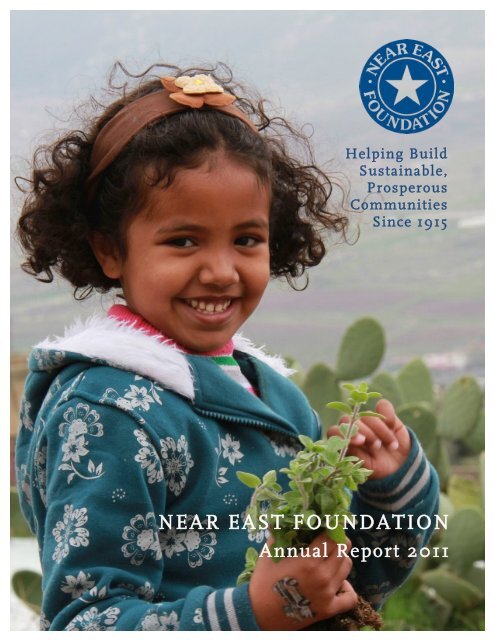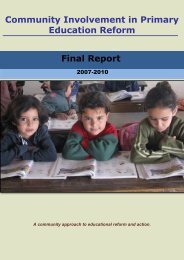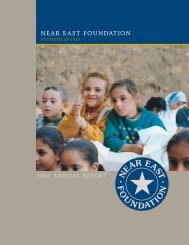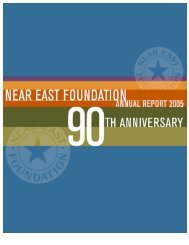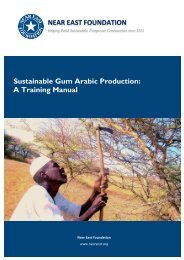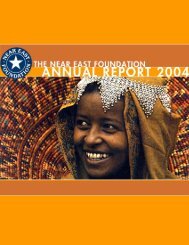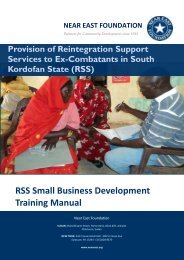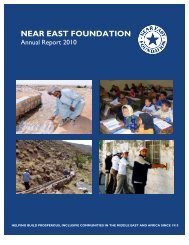NEF 2011 Annual Report - Near East Foundation
NEF 2011 Annual Report - Near East Foundation
NEF 2011 Annual Report - Near East Foundation
Create successful ePaper yourself
Turn your PDF publications into a flip-book with our unique Google optimized e-Paper software.
Helping Build<br />
Sustainable,<br />
Prosperous<br />
Communities<br />
Since 1915<br />
NEAR EAST FOUNDATION<br />
<strong>Annual</strong> <strong>Report</strong> <strong>2011</strong><br />
<strong>Near</strong> <strong>East</strong> <strong>Foundation</strong> • 432 Crouse Hinds Hall • 900 S. Crouse Avenue • Syracuse, NY 13244 • Tel: 315-428-8670
NEAR EAST FOUNDATION<br />
<strong>2011</strong>: A YEAR OF IMPACT AND INNOVATION<br />
PROGRAM HIGHLIGHTS –<br />
<strong>NEF</strong> works with local partners to<br />
build more prosperous, sustainable<br />
and inclusive communities in the<br />
Middle <strong>East</strong> and Africa. In fiscal year<br />
<strong>2011</strong>, with assistance from <strong>NEF</strong>:<br />
• Tens of thousands of subsistence<br />
farmers in Mali increased<br />
production and ensured food<br />
security for their villages, despite<br />
ongoing drought and the threat of<br />
famine.<br />
• Girls school attendance in rural<br />
Morocco improved dramatically –<br />
from 10 percent to 98 percent,<br />
with 95 percent retention rates in targeted areas.<br />
• <strong>Near</strong>ly 25,000 refugees in Sudan received healthcare – from immunizations and<br />
maternal care to HIV awareness education.<br />
• Tens of thousands of schoolchildren in Palestine improved their nutritional intake and<br />
school performance.<br />
• Thousands of farmers in Upper Egypt improved their livelihoods by increasing<br />
production and connecting to markets at home and abroad.<br />
• Thousands of entrepreneurs overcame struggling economies to successfully launch<br />
their own small businesses in Armenia, Jordan, Palestine, and Sudan.<br />
• Thousands of women and at-risk youth were empowered through training in business,<br />
communication, and leadership skills in Egypt, Jordan, Mali, and Palestine.<br />
ORGANIZATION HIGHLIGHTS –<br />
• U.S.-based fixed costs decreased by 50 percent between FY 2010 and FY <strong>2011</strong>, following<br />
a dedicated restructuring, administrative staff reductions, and a move to the Syracuse<br />
University Campus.<br />
• The strategic partnership with Syracuse University developed significantly over its first<br />
year. Students helped create <strong>NEF</strong>’s new organization-wide monitoring and evaluation<br />
system, renowned faculty in business and conflict management guided the design of a<br />
program to help Sudanese ex-combatants reintegrate into society after war, and SU<br />
students gained experience through internship opportunities.<br />
<strong>Near</strong> <strong>East</strong> <strong>Foundation</strong> • 432 Crouse Hinds Hall • 900 S. Crouse Avenue • Syracuse, NY 13244 • Tel: 315-428-8670
Dear Friend,<br />
The <strong>Near</strong> <strong>East</strong> <strong>Foundation</strong> marked its 96 th<br />
year of service in <strong>2011</strong>, continuing its<br />
important work bringing positive change to<br />
the lives of tens of thousands of vulnerable<br />
and impoverished people in partner<br />
communities throughout the Middle <strong>East</strong><br />
and Africa.<br />
<strong>NEF</strong>’s extraordinary impact is made possible<br />
by a legion of supporters and a dedicated<br />
force of more than 70 field staff – all<br />
working in their native country, where they<br />
have unparalleled insight and a vested<br />
interest in making a difference.<br />
In this report, you will find highlights of<br />
what we accomplished by working together<br />
in <strong>2011</strong> and a snapshot of the ways <strong>NEF</strong><br />
partner communities grew to be more<br />
A Note from <strong>NEF</strong>’s Leadership<br />
prosperous and sustainable, improving the daily reality for individuals and families throughout<br />
the region.<br />
True to our organization’s pioneering spirit, <strong>NEF</strong> continues to confront the challenges of our<br />
dynamic times. In a year that brought tremendous changes to Egypt, Sudan, and across the<br />
Middle <strong>East</strong>, <strong>NEF</strong>’s work remains as vital as ever. Today, our teams stand ready in seven countries,<br />
working hand-in-hand with local communities to address pressing development issues, advance<br />
sustainability, and promote equality and peace.<br />
In <strong>2011</strong>, our program areas evolved to align around key constituents and the main challenges they<br />
face. In regions experiencing tectonic shifts, we are leading the way toward progress and<br />
prosperity by addressing critical issues such as unemployment, climate change, gender inequality,<br />
and youth disenfranchisement. Additionally, we continue to provide emergency humanitarian aid<br />
where our experienced field teams are well positioned to support relief efforts.<br />
Thank you for supporting <strong>NEF</strong>. Your commitment is helping to build a better world. As we<br />
celebrate the achievements of <strong>2011</strong>, we look forward to working with you in 2012 and the years<br />
ahead to chart a brighter future – one community and one life at a time.<br />
Sincerely,<br />
<strong>NEF</strong>’s Board Chair and President at Lake Sevan, during a<br />
<strong>2011</strong> trip to visit partner communities in rural Armenia<br />
Shant Mardirossian<br />
Board Chair<br />
Charles Benjamin<br />
President<br />
<strong>Near</strong> <strong>East</strong> <strong>Foundation</strong> • 432 Crouse Hinds Hall • 900 S. Crouse Avenue • Syracuse, NY 13244 • Tel: 315-428-8670
BUILDING SUSTAINABLE, PROPSEROUS COMMUNITIES<br />
For 96 years, the <strong>Near</strong> <strong>East</strong> <strong>Foundation</strong> (<strong>NEF</strong>) has operated at the forefront of the international<br />
development community, leading innovative social and economic development.<br />
The communities where <strong>NEF</strong> works are home to some of the most disadvantaged people in their<br />
region – social groups coping with conflict, facing discrimination and exclusion from civic life,<br />
and isolated by their environment.<br />
In <strong>2011</strong>, <strong>NEF</strong> worked with vulnerable and impoverished partner communities in seven countries –<br />
Armenia, Egypt, Jordan, Mali, Morocco, the Palestinian Territories, and Sudan – to deliver<br />
sustainable change that will improve lives for generations.<br />
During the year we also refined our program focus, increasing our effectiveness and capacity to<br />
serve in four core areas:<br />
• Sustainable Agriculture, Natural Resource Management, and Climate Change Adaptation<br />
• Microenterprise Development<br />
• Civic Engagement and Education<br />
• Peacebuilding through Economic Cooperation<br />
<strong>NEF</strong>'s approach remains rooted in its Knowledge, Voice, and Enterprise framework to provide<br />
individuals with fundamental opportunities and tools: the knowledge to successfully engage in<br />
civic and economic life, a voice in public decisions that affect each individual’s wellbeing, and a<br />
means to earn a sufficient income through dignified and sustainable work.<br />
<strong>NEF</strong> is pioneering new and<br />
exciting ways to make a<br />
difference, including: finding<br />
more efficient methods to use<br />
water that increase agricultural<br />
productivity, food security, and<br />
long-term sustainability; helping<br />
young people find a voice in local<br />
government and developing a<br />
new generation of civic leaders;<br />
establishing businesses and<br />
creating much-needed jobs;<br />
breaking down barriers to<br />
educate and empower women<br />
and girls; pioneering climate<br />
change adaptation strategies and policy responses; and helping build peace and reconciliation<br />
through grassroots economic development.<br />
Please read on to learn how partner communities became more resilient, prosperous, inclusive,<br />
and sustainable as a result of <strong>NEF</strong> programs in fiscal year <strong>2011</strong>.<br />
<strong>Near</strong> <strong>East</strong> <strong>Foundation</strong> • 432 Crouse Hinds Hall • 900 S. Crouse Avenue • Syracuse, NY 13244 • Tel: 315-428-8670
FY <strong>2011</strong> PROGRAM ACHIEVEMENTS<br />
SUSTAINABLE AGRICULTURE, NATURAL RESOURCE MANAGEMENT, AND<br />
CLIMATE CHANGE ADAPTATION<br />
Farming, livestock, and fishing form the economic core of many communities where <strong>NEF</strong> works.<br />
<strong>NEF</strong> staff members help farmers, policy-makers, and natural resource-dependent populations<br />
understand and adapt to climate change, adopt more efficient production methods, build food<br />
security, increase income, and conserve natural resources.<br />
EGYPT—HELPING FARMERS ADAPT TO<br />
CLIMATE CHANGE<br />
People served: 2,500 families, newly<br />
relocated to Upper Egypt<br />
Impact:<br />
• Farmers increased food security by adopting<br />
appropriate agricultural practices, such as<br />
crop varieties best suited for the desert<br />
region<br />
• Farmers linked to new markets in and<br />
outside of Egypt to help boost income.<br />
• Strengthened local skills in farming<br />
practices, marketing, and financial<br />
management<br />
plans to send a million more by 2017.<br />
Through this project, <strong>NEF</strong> and its affiliate, the<br />
Center for Development Services, explored<br />
links between climate change, water<br />
management, public health, and agricultural<br />
livelihoods with the support of the International<br />
Development Research Center. The field<br />
team worked with 2,500 settler families in 3<br />
villages to facilitate more productive,<br />
profitable, and ecologically-sustainable<br />
farming practices through such activities as<br />
creating a nursery to determine optimal crop<br />
varieties, and introducing improved seeds and<br />
new crop varieties. Participants received<br />
training and technical assistance in<br />
fertilization, irrigation, post-harvesting, and<br />
biological pest control, as well as increased<br />
access and linkages to wholesale markets.<br />
Funding provided by the International<br />
Development Research Council (IDRC)<br />
MALI—BUILDING FOOD SECURITY<br />
In Egypt, climate change has undermined<br />
agricultural livelihoods and public health.<br />
Erratic rainfall and the increasing likelihood of<br />
drought are particularly dire for vulnerable<br />
settler communities in Upper Egypt, a desert<br />
area west of Lake Nasser, where the Egyptian<br />
government has resettled 60,000 people and<br />
People served: More than 50,000 farmers,<br />
herders, fishermen, and local government<br />
officials in Mali’s inland delta<br />
Impact:<br />
• 46 villages adopted improved practices for<br />
water resource management and<br />
ecosystem restoration<br />
• Local citizens and elected officials gained<br />
new technical and management skills to<br />
sustainably manage natural resources<br />
<strong>Near</strong> <strong>East</strong> <strong>Foundation</strong> • 432 Crouse Hinds Hall • 900 S. Crouse Avenue • Syracuse, NY 13244 • Tel: 315-428-8670
• 7,500 farmers in 10 villages established<br />
market gardens using spring water<br />
• New market gardens generated $42,000 in<br />
new income, a 108 percent increase<br />
• 4 local conventions were developed and<br />
approved to improve management of<br />
forests, rangelands, and waterways<br />
<strong>NEF</strong> assisted the inhabitants of 46 villages to<br />
cope with changes in rainfall, temperature,<br />
and river flow that are threatening their<br />
livelihoods. <strong>NEF</strong> provided training in new<br />
techniques for soil and water conservation,<br />
introduced new food crops and production<br />
methods, and facilitated linkages to markets<br />
where they can sell their crops. To improve<br />
local capacity to manage and share resources,<br />
<strong>NEF</strong> helped communities harness nonconventional<br />
water resources, manage forests<br />
and fisheries for sustainable use, and restore<br />
wetlands and rangelands. <strong>NEF</strong>’s holistic<br />
approach combined technical training with the<br />
development of local natural resource<br />
governance systems and institutions, and<br />
advocacy for policy changes. All the activities<br />
were designed to deliver sustainable solutions<br />
that can be maintained by the communities.<br />
<strong>NEF</strong> worked with local governments to<br />
mainstream climate change into local<br />
development planning through vulnerability<br />
assessments and local conventions to promote<br />
improved natural resource management. On<br />
the basis of this training and planning, <strong>NEF</strong><br />
supported micro-projects designed to adapt<br />
livelihood activities to climate change. A radio<br />
program provided community members with<br />
important information about climate change<br />
and innovative approaches for agriculture in a<br />
changing environment.<br />
Funding provided by the U.S. Agency for<br />
International Development (USAID) and the<br />
Swedish International Development Agency (Mali<br />
Folk Center)<br />
Funding provided by Oxfam Novib, Fondation<br />
Ensemble, Canada-Mali Joint Fund<br />
MALI—BUILDING RESILIENCE TO CLIMATE<br />
CHANGE<br />
People served: More than 3,000 farmers in<br />
Mopti and Douentza<br />
Impact:<br />
• 4 villages constructed water collection<br />
basins for rice production by more than<br />
200 households<br />
MOROCCO—HELPING FARMERS USE<br />
SCARCE WATER RESOURCES EFFICIENTLY<br />
People served: 2,000 people in 20<br />
communities in arid eastern Morocco<br />
Impact:<br />
• 1,000 people learned improved agricultural<br />
water management<br />
<strong>Near</strong> <strong>East</strong> <strong>Foundation</strong> • 432 Crouse Hinds Hall • 900 S. Crouse Avenue • Syracuse, NY 13244 • Tel: 315-428-8670
• 10 communities developed Agricultural<br />
Water Action Plans to guide water<br />
management improvements<br />
• More than 600 people improved their<br />
income through new agricultural<br />
techniques and technologies that conserved<br />
water resources<br />
<strong>NEF</strong> is helping two thousand small farmers in<br />
arid eastern Morocco use agricultural water<br />
more efficiently, more productively, and more<br />
profitably. Farmers have increased their<br />
income as a direct result of <strong>NEF</strong> training and<br />
technical assistance that introduce more waterefficient<br />
crops, irrigation, and farming<br />
practices. These activities enable community<br />
members to manage their water resources<br />
holistically for long-term sustainability. <strong>NEF</strong><br />
also promotes the sustainable growth of<br />
agriculture by emphasizing commercially<br />
viable crops and linking them to markets.<br />
Funding provided by the U.S. Agency for<br />
International Development (USAID)<br />
SUDAN—IMPROVING LIVELIHOODS<br />
THROUGH SUSTAINABLE, PROFITABLE GUM<br />
ARABIC PRODUCTION<br />
People served: 400 farmers in central<br />
Sudan<br />
Impact:<br />
• Producer income increased by 25 percent<br />
• More than 400 hectares of gum-producing<br />
woodlands were protected by community<br />
initiatives<br />
• More than 100 people received $10,000 in<br />
microcredit loans for activities to improve<br />
production and protect the environment;<br />
100 percent loan repayment rate and 25<br />
percent growth in loan capital<br />
In central Sudan—where 1 in 5 people earns<br />
income from gum arabic and 60 to 95 percent<br />
of people in the gum producing region live in<br />
poverty—<strong>NEF</strong> helped hundreds of farmers<br />
learn simple techniques to improve gum<br />
production (and income), break debt bondage<br />
with intermediaries through micro-credit, and<br />
escape the vicious cycle of povertyenvironment<br />
degradation.<br />
Working with gum arabic producer<br />
associations in North Kordofan, we are helping<br />
farmers become better natural resource<br />
stewards. In turn, they preserve the forest on<br />
which they depend by planting Acacia trees<br />
and developing strategies to counter negative<br />
impacts of climate change.<br />
Funding provided by the Flora Family <strong>Foundation</strong><br />
and the International <strong>Foundation</strong><br />
<strong>Near</strong> <strong>East</strong> <strong>Foundation</strong> • 432 Crouse Hinds Hall • 900 S. Crouse Avenue • Syracuse, NY 13244 • Tel: 315-428-8670
CIVIC ENGAGMENT AND EDUCATION<br />
Education is a critical part of every <strong>NEF</strong> project and is vital to achieving long-term change. <strong>NEF</strong> and<br />
its local partners train citizens to become better civic leaders, help community groups take collective<br />
action, and support governments in addressing constituent needs—with a focus on amplifying the<br />
voice of youth in public decision-making.<br />
MOROCCO—IMPROVING RURAL PRIMARY<br />
EDUCATION AND ADVANCING COMMUNITY-<br />
BASED REFORMS<br />
People served: 16,000 schoolchildren,<br />
including 8,000 girls, and their communities<br />
in the High Atlas mountains<br />
Impact:<br />
• In 114 rural schools, girls’ enrollment rose<br />
from 10 percent to 98 percent, with 95<br />
percent retention rates<br />
• Parent participation in Parent-Teacher<br />
Associations (PTAs) increased by 50<br />
percent<br />
• PTAs established small businesses that<br />
generated $60,000 to invest in school<br />
operations in more than 100 villages<br />
upon word-of-mouth and government<br />
demand. During the multi-year project that<br />
concluded in FY <strong>2011</strong>, <strong>NEF</strong> worked with the<br />
Moroccan Ministry of Education to develop<br />
PTAs, establish partnerships between local<br />
government and the community, and create<br />
income-generating projects to ensure<br />
sustainability in more than 100 villages. <strong>NEF</strong>’s<br />
efforts improved quality of primary education<br />
for 16,000 children in rural Morocco and<br />
improved access to education for 8,000 girls.<br />
With <strong>NEF</strong> support, PTAs generated more than<br />
$60,000 to invest in school maintenance and<br />
implemented 400 education initiatives.<br />
Funding provided by the U.S. State Department<br />
Middle <strong>East</strong> Partnership Initiative (MEPI), the<br />
Flora Family <strong>Foundation</strong>, Geneva Global, and<br />
private donors<br />
MOROCCO—BUILDING A DIALOGUE<br />
BETWEEN GOVERNMENT AND YOUTH<br />
<strong>NEF</strong>’s model of engaging communities to<br />
increase girls’ education in rural Morocco<br />
resulted in dramatic results: girls’ attendance<br />
rates jumped from 10 percent to 98 percent,<br />
with retention rates of 95 percent. Piloted in a<br />
handful of villages, the model is now common<br />
across the vast southern region and is on the<br />
cusp of expansion to the national level based<br />
People served: More than 1,000 youth and<br />
government officials<br />
Impact:<br />
• 5 Youth Councils formed in major<br />
municipalities<br />
• More than 500 youth and community<br />
leaders participated in Youth Forums<br />
promoting dialogue between youth and<br />
local government officials<br />
In <strong>2011</strong>, <strong>NEF</strong> began working to strengthen<br />
relationships between youth and their elected<br />
officials, foster youth leadership and<br />
education, and increase the effectiveness of<br />
local government outreach to youth<br />
constituents. In both rural and urban areas of<br />
<strong>Near</strong> <strong>East</strong> <strong>Foundation</strong> • 432 Crouse Hinds Hall • 900 S. Crouse Avenue • Syracuse, NY 13244 • Tel: 315-428-8670
Morocco, <strong>NEF</strong> aims to help train a new<br />
generation of civic leaders, and to create an<br />
ongoing, constructive dialogue that elevates<br />
the concerns of youth in political discussions<br />
and policymaking. Activities address the<br />
problems at the heart of the Arab Spring—lack<br />
of voice and jobs. The youth activities,<br />
conducted as part of USAID’s Local<br />
Governance Program, are among the first in<br />
Morocco and North Africa to establish Youth<br />
Councils to bridge the gap between young<br />
people and their local elected officials; they<br />
may serve as a model for communities across<br />
the region.<br />
Funding provided by the U.S. Agency for<br />
International Development (USAID) under subcontract<br />
with RTI International<br />
MOROCCO—EMPOWERING YOUTH IN<br />
CASABLANCA’S SLUMS<br />
People served: 10,000 at-risk youth<br />
Impact:<br />
• 1,500 youth received training in leadership,<br />
civic engagement, and skills that increase<br />
employability<br />
• 5 youth associations received capacity<br />
building trainings and support<br />
• Participating youth connected with<br />
vocational training opportunities<br />
In a three-year project that concluded in FY<br />
<strong>2011</strong>, <strong>NEF</strong> helped reduce social isolation and<br />
political extremism among at-risk youth in the<br />
Sidi Moumen and Nouaceur peri-urban slums<br />
of Casablanca. Youth leaders were trained in<br />
leadership and communication, vocational<br />
skills that led to employment, and such life<br />
skills as conflict-resolution. In turn, youth<br />
leaders trained their peers and helped organize<br />
them into community development associations.<br />
The project empowered youth through<br />
leadership and civic engagement initiatives,<br />
and created pathways for economic independence<br />
for youth. More than 1,500 youth<br />
received training through the program, and<br />
more than 10,000 youth participated in project<br />
activities. Additionally, <strong>NEF</strong> worked with<br />
municipal government officials to improve<br />
their outreach activities to youth and organized<br />
events to promote constructive expression of<br />
youth needs.<br />
Funding provided by the U.S. Agency for<br />
International Development (USAID)<br />
<strong>Near</strong> <strong>East</strong> <strong>Foundation</strong> • 432 Crouse Hinds Hall • 900 S. Crouse Avenue • Syracuse, NY 13244 • Tel: 315-428-8670
MICROENTERPRISE DEVELOPMENT<br />
Creating jobs and generating income is at the heart of <strong>NEF</strong>’s work to help break the cycle of poverty.<br />
<strong>NEF</strong> helps people in rural and urban communities plan, establish, and maintain their own small<br />
businesses by providing training, mentoring, and financing that deliver increased income in the<br />
short-term and long-term sustainability. <strong>NEF</strong> places a special emphasis on helping women and<br />
young people lift themselves and their families out of poverty by overcoming traditional barriers to<br />
employment and entrepreneurship.<br />
ARMENIA—REBUILDING THE RURAL<br />
ECONOMY<br />
People served: 150 rural entrepreneurs and<br />
new employees in the rural regions of Gegharkunik,<br />
Lori, Shirak, and Vayots Dzor<br />
Impact:<br />
• More than 50 aspiring entrepreneurs<br />
received training in business management<br />
• A $30,000 microcredit fund was<br />
established to support new businesses<br />
• A network of 15 micro-franchise IT centers<br />
was created<br />
• 14 small businesses were established<br />
• More than 85 new jobs (seasonal and<br />
permanent) were created<br />
a competitive advantage or strong market<br />
niche, such as information technology (IT)<br />
centers, dried fruit production, and fish<br />
farming.<br />
<strong>NEF</strong> and its partners established a microcredit<br />
fund to help start-up businesses. With this<br />
fund, new entrepreneurs started 30 diverse<br />
businesses. These businesses included 15 IT<br />
centers, providing Internet access and<br />
computer training, through a microfranchise<br />
model that can be expanded. <strong>NEF</strong> supported<br />
aspiring IT entrepreneurs in four rural<br />
regions, providing them with start-up capital,<br />
and assistance with business plan design and<br />
all aspects of operations. The IT centers have<br />
become vital parts of their village, a place<br />
where local residents have access to technology<br />
and computer training.<br />
Funded by the Armenia Fund of the USA, the Dan<br />
and Stacey Case Family <strong>Foundation</strong> and private<br />
donors<br />
JORDAN—DEVELOPING THE ECONOMY IN<br />
POVERTY POCKETS<br />
By supporting entrepreneurs and new<br />
business creation, <strong>NEF</strong> is helping break the<br />
cycle of unemployment and poverty in rural<br />
Armenian communities—where one in four<br />
people is without a job. The project focuses on<br />
developing businesses where rural areas have<br />
People served: More than 1,600 people<br />
living in 6 of Jordan’s poorest regions<br />
Impact:<br />
• Community members started 15 collective<br />
businesses with more than 1,600<br />
shareholders<br />
• Members of 41 community-based<br />
associations gained skills in organizational<br />
and business management, including 3<br />
<strong>Near</strong> <strong>East</strong> <strong>Foundation</strong> • 432 Crouse Hinds Hall • 900 S. Crouse Avenue • Syracuse, NY 13244 • Tel: 315-428-8670
women’s associations and 3 youth<br />
associations<br />
• 135 unemployed youth and poor families<br />
received $250,000 in microcredit loans to<br />
start small businesses; loan<br />
reimbursement was over 90 percent<br />
• 20 rural schools were renovated and<br />
equipped for children with disabilities<br />
<strong>NEF</strong> partnered with the Jordanian Hashemite<br />
Fund to stimulate economic development in<br />
six of the country’s poorest regions—areas<br />
designated as “poverty pockets” by the<br />
Jordanian government. This three-year project<br />
concluded in <strong>2011</strong> after establishing fifteen<br />
community-owned cooperative businesses—<br />
including three large-scale agricultural<br />
operations—and creating dozens of jobs. The<br />
businesses continue to generate income for<br />
hundreds of members in their communities.<br />
<strong>NEF</strong> activities included training local citizens<br />
and community-based organizations in basic<br />
principles of economic development; constructing<br />
or upgrading basic physical and social<br />
infrastructure; and supporting enterprise development<br />
through business training, small<br />
grants, and microcredit.<br />
Funding provided by the Jordanian Ministry of<br />
Planning and International Cooperation<br />
PALESTINE & JORDAN—HELPING<br />
WOMEN DEVELOP BUSINESSES AND<br />
INCOME<br />
People served: More than 1,200 members<br />
of community women’s associations<br />
Impact:<br />
• Members of 20 women’s organizations<br />
developed skills in strategic planning,<br />
business management, proposal writing,<br />
and community mobilization<br />
• 26 women’s association started businesses,<br />
including school canteens, food processing,<br />
and home gardens<br />
• 270 women gained employment through<br />
new businesses<br />
When a woman earns a wage and financial<br />
independence, her income improves the<br />
quality of life for the entire family – including<br />
better nutrition and more educational<br />
opportunities for children.<br />
<strong>NEF</strong> provided training, mentorship, and<br />
technical assistance to women-led associations<br />
to create income-generating activities and<br />
increase their capacity and effectiveness to<br />
deliver social services for members.<br />
Women’s associations are a crucial resource<br />
for women: they play a dual role of creating<br />
jobs and income for their members (many pay<br />
yearly dividends) while providing social<br />
services such as savings and revolving credit.<br />
There are many such associations in Jordan<br />
and Palestine, but they generally lack<br />
resources and skills. <strong>NEF</strong> trains association<br />
leaders in organizational and business<br />
management, and leads them in strategic<br />
planning. <strong>NEF</strong> staff actively continues to coach<br />
association members in applying their new<br />
skills and building cooperative businesses.<br />
Funding provided by the Canadian International<br />
Development Agency (CIDA) and the Embassy of<br />
New Zealand<br />
<strong>Near</strong> <strong>East</strong> <strong>Foundation</strong> • 432 Crouse Hinds Hall • 900 S. Crouse Avenue • Syracuse, NY 13244 • Tel: 315-428-8670
BUILDING PEACE THROUGH ECONOMIC COOPERATION<br />
In areas affected by conflict, <strong>NEF</strong> promotes peace by building strong relationships of trust, mutual<br />
understanding, and shared economic interest through collaborative business activities and<br />
grassroots economic cooperation, and by strengthening conflict management skills in practical<br />
ways. This new program area was created in <strong>2011</strong>; additional projects will launch in 2012.<br />
SUDAN—HELPING EX-COMBATANTS<br />
FIND ALTERNATIVE LIVELIHOODS TO WAR<br />
People served: 180 ex-combatants – former<br />
soldiers in Sudan’s civil war<br />
Impact:<br />
• 180 ex-combatants received training in<br />
business development and prepared<br />
business plans<br />
• 180 ex-combatants established microenterprises<br />
to facilitate economic<br />
reintegration in their communities<br />
<strong>NEF</strong> launched a new initiative to support the<br />
peace process in war-torn South Kordofan by<br />
providing an alternative to conflict for former<br />
Sudanese combatants. In FY <strong>2011</strong> the project<br />
provided business and conflict management<br />
training to its first group of 180 excombatants;<br />
hundreds more will participate<br />
in 2012. <strong>NEF</strong> training in business and<br />
conflict management skills is providing the<br />
tools ex-combatants need to reintegrate into<br />
their communities, both economically and<br />
socially. After individuals receive training,<br />
<strong>NEF</strong> offers them in-kind grants and ongoing<br />
business coaching to help advance<br />
sustainable peace, stability, and economic<br />
opportunity in conflict-affected areas. The<br />
project was designed in conjunction with<br />
expert faculty from Syracuse University’s<br />
Program for the Advancement of Research<br />
on Conflict and Collaboration. It builds upon<br />
<strong>NEF</strong>’s more than three decades of work in<br />
Sudan, where <strong>NEF</strong> is one of the few<br />
continuously operating international nongovernmental<br />
organizations in the country.<br />
Funding provided by the United Nations<br />
Development Programme (UNDP)<br />
<strong>Near</strong> <strong>East</strong> <strong>Foundation</strong> • 432 Crouse Hinds Hall • 900 S. Crouse Avenue • Syracuse, NY 13244 • Tel: 315-428-8670
SERVING THE MOST VULNERABLE<br />
in and around Nablus, Jenin, Qalqilia,<br />
Tulkarm, Tubas, and Hebron. <strong>NEF</strong> delivered<br />
food commodities to 24 women’s centers,<br />
where approximately 2,000 women earned<br />
an income by producing enriched snacks that<br />
<strong>NEF</strong> distributed to kindergartens and<br />
primary schools. Most of the women<br />
continue to operate their businesses and sell<br />
snacks at the schools.<br />
PALESTINE—FEEDING SCHOOL<br />
CHILDREN & IMPROVING PRIMARY<br />
EDUCATION<br />
People served: 54,000 Palestinian children,<br />
more than 2,000 members of community<br />
women’s associations, 140 primary school<br />
teachers and administrators<br />
Impact:<br />
• Students in 189 kindergartens and 100<br />
primary schools received supplemental<br />
nutrition<br />
• 24 women’s centers provided food to<br />
schools, providing women with increased<br />
income<br />
In FY <strong>2011</strong>, <strong>NEF</strong>’s extremely successful<br />
seven-year Early Childhood Education and<br />
School Feeding program concluded. In total,<br />
<strong>NEF</strong> provided supplemental nutrition to<br />
approximately 54,000 Palestinian children in<br />
189 kindergartens and 100 primary schools<br />
in the northern and central West Bank. Our<br />
local partners – community-based women’s<br />
associations – continue to provide<br />
nutritionally fortified snacks to many of these<br />
schools through market-based canteens.<br />
Project activities linked school feeding, early<br />
childhood development, and community<br />
development, with a focus on kindergartens<br />
<strong>NEF</strong>’s support for school renovations and<br />
school feeding catalyzed community action to<br />
improve the quality of education in 38<br />
kindergartens in Asira, Nablus, Tulkarm,<br />
Hebron, and Bethlehem. Working with Al-<br />
Najah National University, <strong>NEF</strong> provided<br />
training in early childhood education for<br />
more than 100 teachers and 40 school<br />
principals. With the Danish Representative in<br />
Ramallah, <strong>NEF</strong> distributed LEGOs to 630<br />
West Bank kindergartens, along with an<br />
awareness-raising campaign for teachers on<br />
techniques for reducing stress among<br />
children through play and stimulating<br />
creativity.<br />
Funding provided by the World Food Programme<br />
(WFP), the Flora Family <strong>Foundation</strong>, the Firedoll<br />
<strong>Foundation</strong>, and the Waterford <strong>Foundation</strong><br />
SUDAN—SUPPORTING INTERNALLY<br />
DISPLACED PEOPLE<br />
PROVIDING CRITICAL HEALTH SERVICES<br />
People served: More than 2,000 patients<br />
per month (24,000 per year)<br />
Impact:<br />
• Healthcare services were provided to a<br />
community of 40,000 people outside of<br />
Khartoum<br />
• Training and community outreach<br />
increased community awareness in<br />
HIV/AIDS prevention<br />
<strong>Near</strong> <strong>East</strong> <strong>Foundation</strong> • 432 Crouse Hinds Hall • 900 S. Crouse Avenue • Syracuse, NY 13244 • Tel: 315-428-8670
• Clinic successfully transferred<br />
management to a local health care<br />
organization, ensuring continuity of care<br />
beyond the project<br />
Dar Al-Salaam Al Rabwa is a settlement of<br />
40,000+ internally displaced people living<br />
about 40 kilometers outside Khartoum. Its<br />
inhabitants have little or no access to many<br />
basic services: potable water, education, and<br />
electricity are all scarce or nonexistent. So<br />
was healthcare, before <strong>NEF</strong> built the<br />
community’s first health clinic in 2002.<br />
Over the years, clinic use grew steadily: at the<br />
project’s conclusion in FY <strong>2011</strong> it was serving<br />
more than 2,000 patients a month. <strong>NEF</strong><br />
provided health services including primary<br />
care, obstetrics, pre- and post-natal care,<br />
laboratory testing, family planning,<br />
immunizations, and prescriptions. Staff<br />
conducted home visits and community<br />
education to increase awareness on primary<br />
and reproductive health care, basic hygiene,<br />
and HIV awareness. In total, 20 health care<br />
providers were successfully trained in the<br />
technical aspects of HIV/AIDS prevention,<br />
more than 60 community volunteers were<br />
trained in basic awareness and supplied with<br />
educational materials, 60 community-based<br />
education sessions were held, 160<br />
community leaders and stakeholders<br />
participated in sensitization training, close to<br />
2,000 home visits were<br />
conducted, and more than<br />
5,000 clients participated in<br />
facility- and community-based<br />
education sessions.<br />
Funding provided by the Packard <strong>Foundation</strong>, the<br />
Population Council, the Norris <strong>Foundation</strong>,<br />
UNICEF, UNFPA, and private donors<br />
PROVIDING EMERGENCY FARMING<br />
SUPPORT FOR FOOD SECURITY<br />
People served: 300 internally displaced<br />
farmers and their families in South Kordofan<br />
Impact:<br />
• Participants cultivated 1,500 fedans of<br />
land (5 fedans per family) in areas<br />
otherwise facing possible famine (one<br />
fedan is equal to approximately one acre)<br />
• Farmers received 4.5 tons of certified<br />
sorghum seeds<br />
• Extension services and training for<br />
farmers promoted new knowledge, skills,<br />
and understanding of improved<br />
technologies that will contribute to<br />
attaining food security<br />
When fighting broke out in Sudan’s South<br />
Kordofan State in June <strong>2011</strong>, displacing tens<br />
of thousands of farmers who were unable to<br />
prepare their fields for planting, <strong>NEF</strong> quickly<br />
mobilized to help avert a food crisis by<br />
providing refugees with the supplies they<br />
needed for the growing season. <strong>NEF</strong> helped<br />
to provide equipment for planting and<br />
harvesting, seeds for fast-maturing crops,<br />
and cultivation training.<br />
In FY <strong>2011</strong>, <strong>NEF</strong> handed over<br />
management of the clinic to<br />
Umm al-Moumenein – a<br />
Khartoum-based NGO that<br />
focuses on primary health care<br />
– ensuring its continued<br />
stability and local ownership.<br />
<strong>Near</strong> <strong>East</strong> <strong>Foundation</strong> • 432 Crouse Hinds Hall • 900 S. Crouse Avenue • Syracuse, NY 13244 • Tel: 315-428-8670
ADVANCING OUR STRATEGIC PARTNERSHIP<br />
WITH SYRACUSE UNIVERSITY<br />
<strong>2011</strong> marked the first full year of<br />
partnership between <strong>NEF</strong> and Syracuse<br />
University. At Syracuse, <strong>NEF</strong> is engaging<br />
the talent and creative energy of the<br />
academic community to help solve the<br />
problems facing the Middle <strong>East</strong> and Africa.<br />
In turn, <strong>NEF</strong> is helping train a new<br />
generation of students who will lead the<br />
future of international social and economic<br />
development. Collaborations include faculty<br />
leader-ship in development projects and<br />
student internships that offer first-hand<br />
experience in the field and at the<br />
organizational level.<br />
SU/Maxwell intern, Amy McLuskey, with <strong>NEF</strong> project director,<br />
Abdelkhalk Aandam, during a project assessment in eastern Morocco<br />
In FY <strong>2011</strong>:<br />
• Thirteen program assistants (interns) contributed to <strong>NEF</strong>’s mission and supported our<br />
teams in the field. Interns are assigned a portfolio of activities that include program analysis<br />
and development, and project management. Interns also contribute substantially to<br />
communications and systems development.<br />
• Through the a capstone program of the Maxwell School of Public Affairs, a team of SU students<br />
and faculty helped <strong>NEF</strong> develop a strategic visioning manual for agriculture, natural<br />
resources, and climate change in North and West Africa. The document describes key issues<br />
pertaining to climate change vulnerability and adaptation; identifies major institutions and<br />
initiatives involved in climate change adaptation; analyzes <strong>NEF</strong>’s experience in climate change<br />
adaptation-related activities; makes recommendations for <strong>NEF</strong> programming; and identifies<br />
donors and funding mechanisms for climate change adaptation-related work.<br />
• A newly created <strong>NEF</strong> Fellowship program allowed recent graduates to work with faculty<br />
advisors to assess the strategies and impacts of programs in the field. The first two <strong>NEF</strong> Fellows<br />
traveled to Morocco, where they documented the impact and lessons from <strong>NEF</strong>’s work with<br />
young people in urban slums and with rural primary education.<br />
• <strong>NEF</strong> developed a training curriculum for ex-combatants by working with faculty and<br />
students in the Maxwell School’s Program for the Advancement of Research on Conflict and<br />
Collaboration, and the Entrepreneurship and Emerging Enterprises department of the<br />
Whitman School of Management. The curriculum was adapted for a current project in Sudan,<br />
and in the future can be replicated in other post-conflict areas.<br />
• <strong>NEF</strong> staff contributed to SU classes and programs through regular guest lectures and<br />
providing case studies to ground course work in organizational and field program challenges.<br />
<strong>Near</strong> <strong>East</strong> <strong>Foundation</strong> • 432 Crouse Hinds Hall • 900 S. Crouse Avenue • Syracuse, NY 13244 • Tel: 315-428-8670
FINANCIAL REPORT<br />
!"#"$%$&"'()'*+&#&,+#-'.(/+"+(&'#"'01&$'234'5366' ! !"#"$%$&"'()'7,"+8+"+$/'9$#:'$&;$;'01&$'2345366'<br />
' ' ! ! ! !<br />
7!!
THANK YOU<br />
The <strong>Near</strong> <strong>East</strong> <strong>Foundation</strong> expresses gratitude to our supporters, who help us<br />
improve the lives of the most vulnerable, impoverished people in communities<br />
throughout the Middle <strong>East</strong> and Africa.<br />
Our work is made possible by generous contributions from individuals,<br />
foundations, corporations, governments, non-governmental organizations,<br />
multilateral agencies, volunteers, and local partners.<br />
BOARD OF DIRECTORS<br />
Shant Mardirossian, Chair<br />
Johnson Garrett, Vice Chair<br />
Haig Mardikian, Secretary<br />
Charles Benjamin, Ph.D., President, ex-officio<br />
Mehrzad Boroujerdi, Ph.D.<br />
Amir Ali Farman-Farma, Ph.D.<br />
Alexander Ghiso<br />
Linda K. Jacobs, Ph.D.<br />
Matthew Quigley<br />
Soroush Shehabi<br />
William Sullivan<br />
Tarek Younes<br />
ACADEMIC COUNCIL<br />
John Kerr<br />
John McPeak<br />
Thomas Mullins<br />
Juliet Sorensen<br />
Michaela Walsh<br />
HONORARY BOARD<br />
Shahnaz Batmanghelid<br />
Ronald Miller<br />
David Mize<br />
Abe Moses<br />
John Goelet<br />
John Grammer<br />
Richard Robarts<br />
Timothy Rothermel, in memorium<br />
Anthony Williams<br />
PRESIDENT'S COUNCIL<br />
H.E. André Azoulay<br />
Ambassador Edward P. Djerejian<br />
Vartan Gregorian, Ph.D.<br />
Ambassador Richard W. Murphy<br />
Her Majesty Queen Noor of Jordan<br />
James Steinberg<br />
Ambassador Frank G. Wisner<br />
<strong>Near</strong> <strong>East</strong> <strong>Foundation</strong> • 432 Crouse Hinds Hall • 900 S. Crouse Avenue • Syracuse, NY 13244 • Tel: 315-428-8670
NEAR EAST FOUNDATION<br />
432 Crouse Hinds Hall<br />
900 S. Crouse Avenue<br />
Syracuse, NY 13244<br />
Tel: (315) 428-8670<br />
Fax: (315) 428-8673<br />
www.neareast.org


